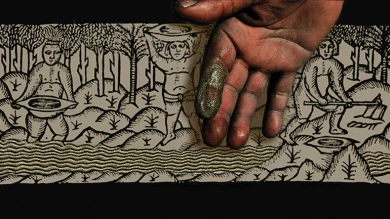-
Wednesday, 31 October 2018
Laboratory. Guided tour and meeting
Mapa Teatro
Sabatini Building, Exhibition Rooms – 11:00 am
Laboratory. Guided tour of the exhibition Mapa Teatro: Of Lunatics, or Those Lacking Sanity with Mapa Teatro and José Antonio Sánchez (prior registration required)Sabatini Building, Auditorium – 4:00 pm
Laboratory. Encounter with Mapa Teatro (prior registration required)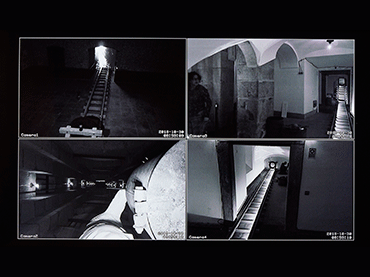
-
Thursday, 4 April 2019 – 7:00 pm
The Living Museum
International premiere
Nouvel Building, Auditorium 400
International premiere of the performance piece by Mapa Teatro The Living Museum, based on an earlier piece by the collective, The Farewell (2017), which tells the real story of the creation and maintenance of a museum by a group of Colombian soldiers in El Borugo, a former FARC camp located in the Amazon rainforest, where the soldiers re-enact, in front of visitors, the conditions of their imprisoned and tortured comrades from the past.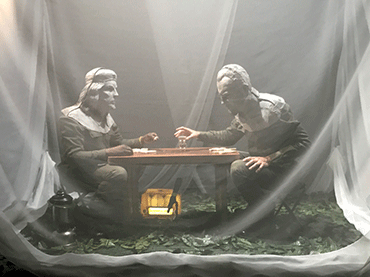
Mapa Teatro
Performance lecture: The Living Museum and Laboratory
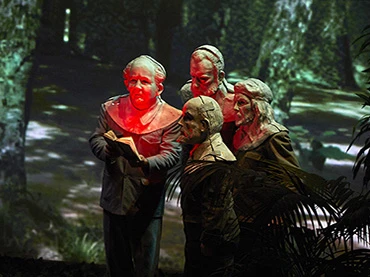
Mapa Teatro. La despedida [The Farewell]. Theatre piece, 2017
Held on 04 Apr 2019
The transdisciplinary collective Mapa Teatro explores the mechanisms that build history, myth and fiction. Their theatre pieces, halfway between installations and new dramaturgies, dissect the violence which has so dominated Colombian society in recent years and dismantle the imaginaries created by colonial reason. In conjunction with the unveiling of the exhibition Of Lunatics, or Those Lacking Sanity, inside the Fissures Programme framework, Mapa Teatro will present a twofold laboratory comprising a guided tour around the show in the morning and an encounter later in the day with José Antonio Sánchez, an Art History lecturer from the Fine Arts Faculty at the University of Castilla-La Mancha (Cuenca) and theorist whose work centres on the relationship between performing and visual arts. The program will be completed with the performance lecture The Living Museum on 4 April 2019.
The Living Museum is a performance lecture which, despite taking place in the Auditorium, strikes up a dialogue with the pieces displayed in the galleries, interrelating two spaces, stage and exhibition, which overlap in this collective’s research. Moreover, it reflects upon the use of the museum institution in memory, collective peace processes and the manufacturing of history. The Living Museum also sets out from an earlier Mapa Teatro piece, La despedida (The Farewell, 2017), and is based on the real case of a group of soldiers who created and ran a museum in El Borugo, a former FARC camp, liberated today, located in the Amazon rainforest, where the guerrilla group held kidnapped soldiers and police. In this museum of historical recreation, soldiers now re-stage, under the visitors’ gaze, the conditions of their imprisoned and tortured comrades. Thus, The Living Museum is an interpretation of the relations between fiction, theatricality and reality.
This reflection is expanded upon on 31 October in a laboratory which surveys the creative process of the exhibition held in the Museo and is set in motion with an investigation into the Sabatini Building’s initial use as a hospital. Following on from an artist-led guided tour, audience members will attend and participate in a conversation between the artists and performing arts theorist José Antonio Sanchez as the laboratory illuminates the processes of translating and transposing texts, documents and archives in theatre fictions and devices.
The Living Museum in collaboration with
Laboratory in collaboration with
Organised by
Museo Reina Sofía
In collaboration with
Participants
Mapa Teatro is a laboratory of artists who work on transdisciplinary creation. Founded in Paris in 1984 by Colombian theatre and visual artists Heidi, Elizabeth and Rolf Abderhalden, Mapa Teatro has been based in Bogotá since 1986. Their work experimentally extends across performance, installation, opera, theatre and ethnographic film and has been on view at international theatre festivals such as the Avignon Festival, the Paris Autumn Festival and FIND in Berlin, and in art institutions like the São Paulo Biennial and SFMOMA.
José Antonio Sánchez is an Art History lecturer at the Fine Arts Faculty of the University of Castilla-La Mancha (Cuenca). He is the co-director, with Victoria Pérez Royo, of the MA in Arts Practice and Visual Culture at the University of Castilla-La Mancha, in collaboration with the Museo Reina Sofía, La Casa Encendida, the Teatros del Canal Dance Centre, the Azala Space for Creation and Teatro Pradillo. He is also the author and editor of a broad number of publications on the relationship between performing and visual arts, for instance Prácticas de lo real en la escena contemporánea (2007 and 2012) and Artes de la escena y de la acción en España 1978-2002 (2006).

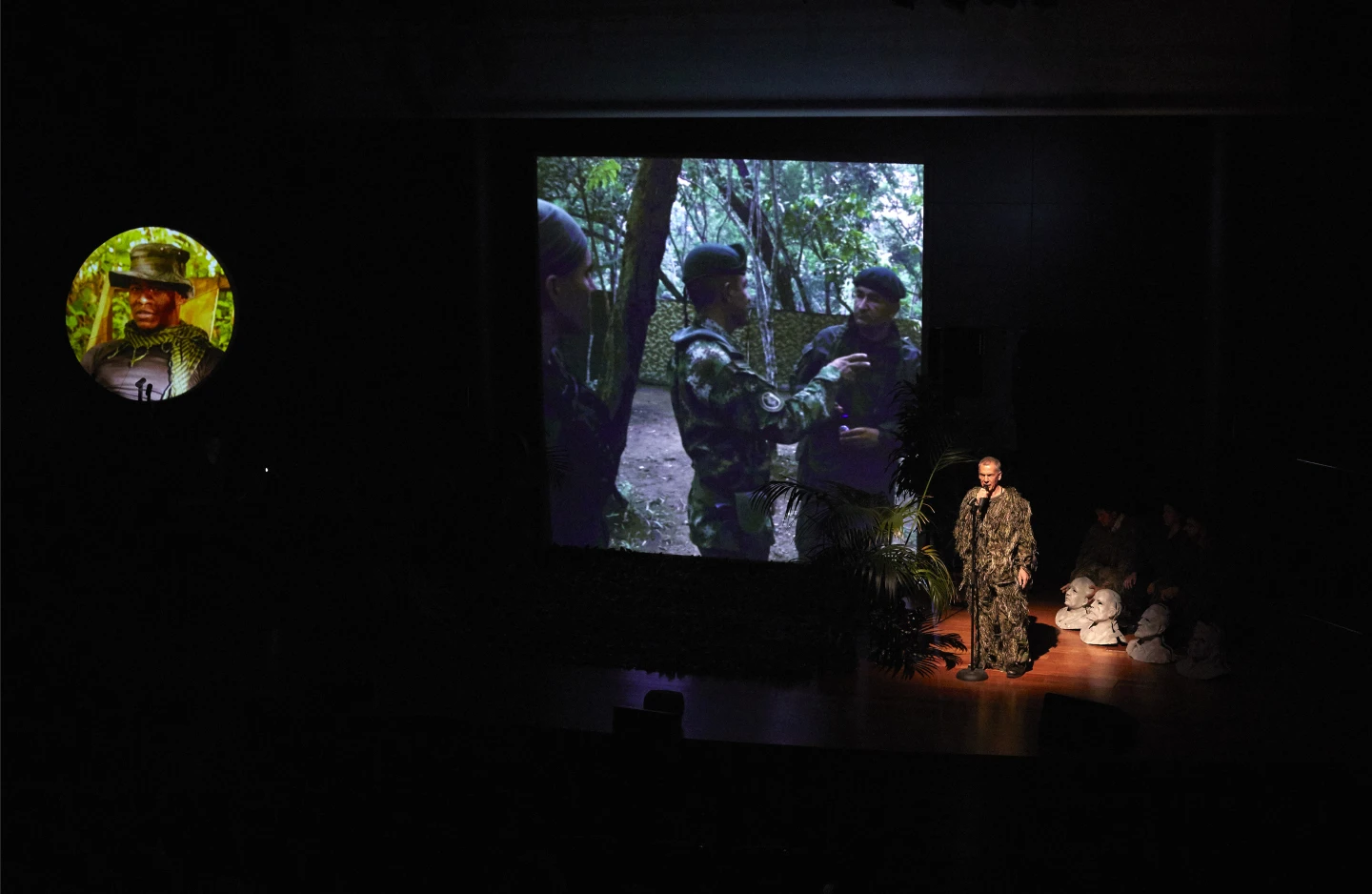
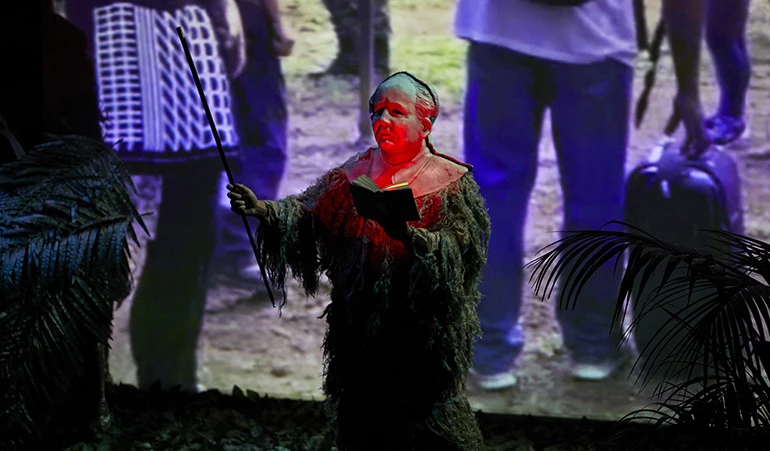
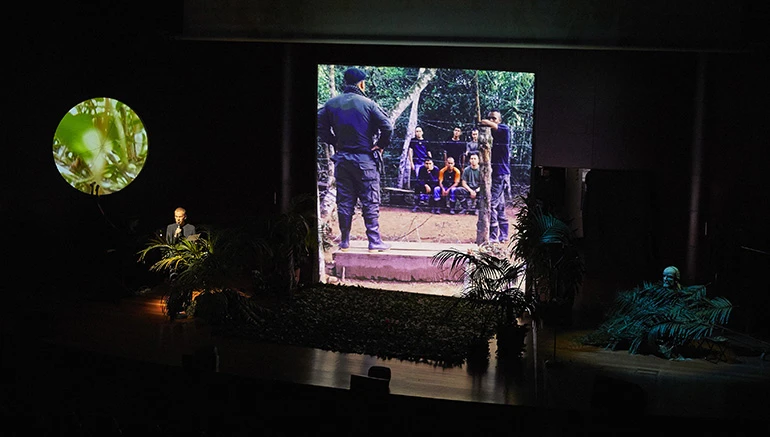
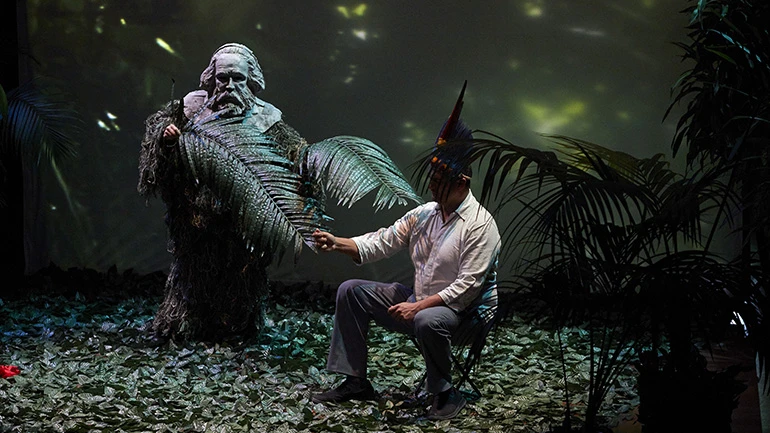
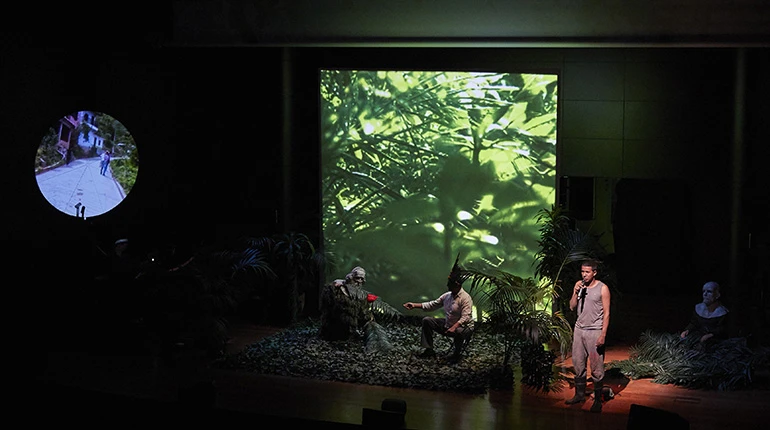
Más actividades

Aesthetics of Peace and Desertion Tactics
8 October 2025 – 24 June 2026
The study group Aesthetics of Peace and Tactics of Desertion: Prefiguring New Pacifisms and Forms of Transitional Justice proposes a rethinking—through both a theoretical-critical and historical-artistic lens—of the intricate network of concepts and practices operating under the notion of pacifism. A term not without contestation and critical tension, pacifism gathers under its name a multiplicity of practices—from anti-militarism and anti-war movements to non-violence activism—while simultaneously opening urgent debates around violence, justice, reparation, and desertion. Here, pacifism is not conceived as a moral doctrine, but as an active form of ethical and political resistance capable of generating aesthetic languages and new positions of social imagination.
Through collective study, the group seeks to update critical debates surrounding the use of violence and non-violence, as well as to explore the conflict of their representation at the core of visual cultures. In a present marked by rearmament, war, genocide, and the collapse of the social contract, this group aims to equip itself with tools to, on one hand, map genealogies and aesthetics of peace—within and beyond the Spanish context—and, on the other, analyze strategies of pacification that have served to neutralize the critical power of peace struggles. Transitional and anti-punitive justice proposals will also be addressed, alongside their intersections with artistic, visual, and cinematic practices. This includes examining historical examples of tribunals and paralegal activisms initiated by artists, and projects where gestures, imaginaries, and vocabularies tied to justice, reparation, memory, and mourning are developed.
It is also crucial to note that the study programme is grounded in ongoing reflection around tactics and concepts drawn, among others, from contemporary and radical Black thought—such as flight, exodus, abolitionism, desertion, and refusal. In other words, strategies and ideas that articulate ways of withdrawing from the mandates of institutions or violent paradigms that must be abandoned or dismantled. From feminist, internationalist, and decolonial perspectives, these concepts have nourished cultural coalitions and positions whose recovery today is urgent in order to prefigure a new pacifism: generative, transformative, and radical.
Aesthetics of Peace and Tactics of Desertion, developed and led by the Museo Reina Sofía’s Studies Management, unfolds through biweekly sessions from October to June. These sessions alternate between theoretical discussions, screenings, work with artworks and archival materials from the Museo’s Collection, reading workshops, and public sessions. The group is structured around sustained methodologies of study, close reading, and collective discussion of thinkers such as Judith Butler, Elsa Dorlin, Juan Albarrán, Rita Segato, Sven Lütticken, Ruth Wilson Gilmore, and Franco “Bifo” Berardi; historical episodes such as the anti-nuclear and anti-arms race movement in Spain; and the work of artists and activists including Rojava Film Commune, Manuel Correa and the Oficina de Investigación Documental (Office for Documentary Investigation), and Jonas Staal, among other initial cases that will expand as the group progresses.

Institutional Decentralisation
Thursday, 21 May 2026 – 5:30pm
This series is organised by equipoMotor, a group of teenagers, young people and older people who have participated in the Museo Reina Sofía’s previous community education projects, and is structured around four themed blocks that pivot on the monstrous.
This fourth and final session centres on films that take the museum away from its axis and make it gaze from the edges. Pieces that work with that which is normally left out: peripheral territories, unpolished aesthetics, clumsy gestures full of intent. Instead of possessing an institutional lustre, here they are rough, precarious and strange in appearance, legitimate forms of making and showing culture. The idea is to think about what happens when central authority is displaced, when the ugly and the uncomfortable are not hidden, when they are recognised as part of the commons. Film that does not seek to be to one’s liking, but to open space and allow other ways of seeing and inhabiting the museum to enter stage.

Intergenerationality
Thursday, 9 April 2026 – 5:30pm
This series is organised by equipoMotor, a group of teenagers, young people and older people who have participated in the Museo Reina Sofía’s previous community education projects, and is structured around four themed blocks that pivot on the monstrous.
The third session gazes at film as a place from which to dismantle the idea of one sole history and one sole time. From a decolonial and queer perspective, it explores films which break the straight line of past-present-future, which mix memories, slow progress and leave space for rhythms which customarily make no room for official accounts. Here the images open cracks through which bodies, voices and affects appear, disrupting archive and questioning who narrates, and from where and for whom. The proposal is at once simple and ambitious: use film to imagine other modes of remembering, belonging and projecting futures we have not yet been able to live.

Remedios Zafra
Thursday March 19, 2026 - 19:00 h
The José Luis Brea Chair, dedicated to reflecting on the image and the epistemology of visuality in contemporary culture, opens its program with an inaugural lecture by essayist and thinker Remedios Zafra.
“That the contemporary antifeminist upsurge is constructed as an anti-intellectual drive is no coincidence; the two feed into one another. To advance a reactionary discourse that defends inequality, it is necessary to challenge gender studies and gender-equality policies, but also to devalue the very foundations of knowledge in which these have been most intensely developed over recent decades—while also undermining their institutional support: universities, art and research centers, and academic culture.
Feminism has been deeply linked to the affirmation of the most committed humanist thought. Periods of enlightenment and moments of transition toward more just social forms—sustained by education—have been when feminist demands have emerged most strongly. Awareness and achievements in equality increase when education plays a leading social role; thus, devaluing intellectual work also contributes to harming feminism, and vice versa, insofar as the bond between knowledge and feminism is not only conceptual and historical, but also intimate and political.
Today, antifeminism is used globally as the symbolic adhesive of far-right movements, in parallel with the devaluation of forms of knowledge emerging from the university and from science—mistreated by hoaxes and disinformation on social networks and through the spectacularization of life mediated by screens. These are consequences bound up with the primacy of a scopic value that for some time has been denigrating thought and positioning what is most seen as what is most valuable within the normalized mediation of technology. This inertia coexists with techno-libertarian proclamations that reactivate a patriarchy that uses the resentment of many men as a seductive and cohesive force to preserve and inflame privileges in the new world as techno-scenario.
This lecture will address this epochal context, delving into the synchronicity of these upsurges through an additional parallel between forms of patriarchal domination and techno-labor domination. A parallel in which feminism and intellectual work are both being harmed, while also sending signals that in both lie emancipatory responses to today’s reactionary turns and the neutralization of critique. This consonance would also speak to how the perverse patriarchal basis that turns women into sustainers of their own subordination finds its equivalent in the encouraged self-exploitation of cultural workers; in the legitimation of affective capital and symbolic capital as sufficient forms of payment; in the blurring of boundaries between life and work and in domestic isolation; or in the pressure to please and comply as an extended patriarchal form—today linked to the feigned enthusiasm of precarious workers, but also to technological adulation. In response to possible resistance and intellectual action, patriarchy has associated feminists with a future foretold as unhappy for them, equating “thought and consciousness” with unhappiness—where these have in fact been (and continue to be) levers of autonomy and emancipation.”
— Remedios Zafra

27th Contemporary Art Conservation Conference
Wednesday, 4, and Thursday, 5 March 2026
The 27th Contemporary Art Conservation Conference, organised by the Museo Reina Sofía’s Department of Conservation and Restoration, with the sponsorship of the Mapfre Foundation, is held on 4 and 5 March 2026. This international encounter sets out to share and debate experience and research, open new channels of study and reflect on conservation and the professional practice of restorers.
This edition will be held with in-person and online attendance formats, occurring simultaneously, via twenty-minute interventions followed by a five-minute Q&A.
